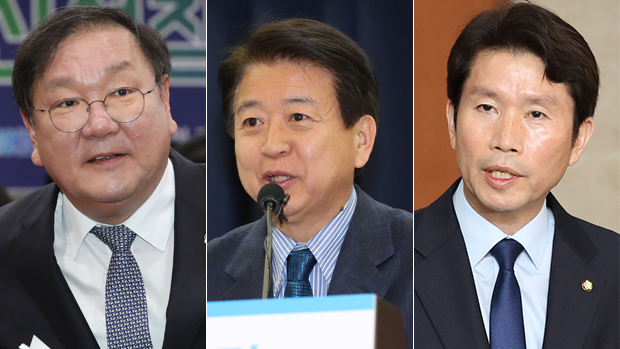The race to become the next floor leader of the ruling Democratic Party is heating up, with all eyes on who will be selected to lead the party through multiple tasks and next year’s general election.
The party is slated to elect its next floor leader Wednesday from among three three-term lawmakers: Rep. Lee In-young, Rep. Noh Woong-rae and Rep. Kim Tae-nyeon.
The election comes amid deepening conflict between the ruling party and the Liberty Korea Party due to the recent fast-tracking of key reform bills, which has prompted the main opposition party to stage protests across the country.
Lee and Kim are widely expected to lead the race based on their solid support base and strong presence, political analysts said.
 |
From left: Rep. Kim Tae-nyeon, Rep. Noh Woong-rae, and Rep. Lee In-young running for floor leader of the ruling Democratic Party. (Yonhap) |
Noh, who has joined the floor leader bid for the third time, is also making all-out efforts to garner support from fellow party members.
Meanwhile, Lee has pledged to seek transformation and unity within the party.
“I will strive for harmony that will open up a new era in which everyone is mainstream and division between the mainstream and nonmainstream is abolished,” Lee said last month while officially announcing his bid.
He holds key roles in multiple groups within the party, but Lee’s charismatic image -- built on his experience as the first chairman of Jundaehyup, a now-disbanded organization of student activists formed in 1987 -- could backfire by casting him as a hard-liner.
Former television reporter Noh has stepped down from his post as chairman of the National Assembly’s Science, ICT, Broadcasting, and Communications Committee to join the bid, marking his third attempt.
“My strength is my ability to converse and communicate with others. I have worked as a reporter, which is all about communication, for 21 years. (As a floor leader) I am certain I can communicate within the party, with the main opposition party and the government,” Noh said.
Kim is seen as a policy expert due to his experience in policy and strategy managing.
He headed the ruling party’s policy planning committee from May 2017 to January 2019. He also held assistant administrator posts in the parliamentary special committee on political reform and the special committee on budget and accounts.
“I am one of the most experienced lawmakers in terms of negotiating with the opposition parties,” Kim said.
To win, a candidate needs at least 65 votes from the 128 ruling party lawmakers. If a single candidate fails to garner the necessary votes, the two candidates with the most number of votes will compete in a final vote.
By Kim Bo-gyung (
lisakim425@heraldcorp.com)








